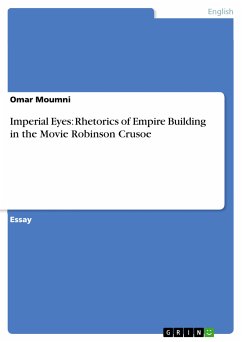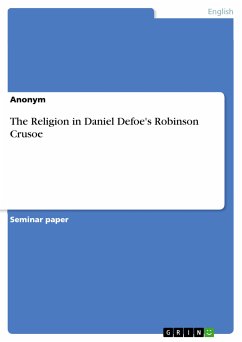Seminar paper from the year 2011 in the subject English Language and Literature Studies - Culture and Applied Geography, grade: 1,6, University of Passau, language: English, abstract: This term paper deals with the representation of religion in general and especially the religious development of the protagonist in the novel Robinson Crusoe by Daniel Defoe. Therefore different phases of the relationship to God and religion will be illustrated and compared with in the following elaborations. Moreover, the role of religion within the Empire and the way it is represented in the medium of the novel is another aspect that will be discussed. The importance of the role of religion in the novel is, as many other aspects as well and the novel as a whole, not only considerable for the reader of Defoe’s time, but is also valid nowadays and therefore timeless. As Robinson Crusoe is “told […] with a religious application of events to the uses to which wise men always apply them, viz. to the instruction of others by this example, and to justify and honour the wisdom of Providence in all the variety of our circumstances, let them happen how they will” (Frick 1986: 109). By creating the protagonist Robinson Crusoe, Defoe has managed to give the readership a character they can easily identify with, because Crusoe awakens interest in his adventures by just being himself. “But […] that interest does not arise because Crusoe’s life resembles those of his contemporaries, not because he is a typical private man. Rather, his life is one of ‘wonders’ unparalleled, ‘variety’ without precedent” (Richetti 1975: 24). The reason why Crusoe’s story is that much worthy for public notice is, that it “is, obviously, being sold as an extravaganza to people who like all of us value the exotic and the various as a pleasurable relief from the humdrum and uniform quality of daily life” (Richetti 1975: 24). To sum it up, Richetti mentions that Crusoe “lives in an uncommon common fashion” (1975: 24f) and as his daily life is made public to the reader as a typical private person it gains attractiveness as well as relevance. Among other things he succeeds in doing so by creating contraries while introducing private and already well-known activities into exciting and exceptional events (cf. Richetti 1975: 24f).
Bitte wählen Sie Ihr Anliegen aus.
Rechnungen
Retourenschein anfordern
Bestellstatus
Storno









